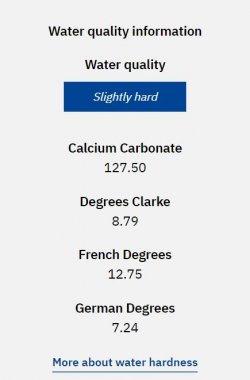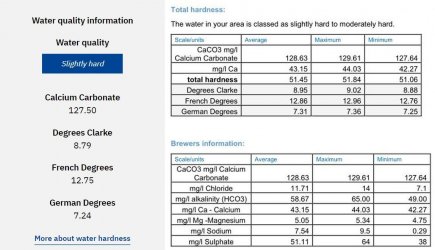Update...
I took the advice of @Slaphppy7

and left a cup of tap water overnight before testing it.
I also ensured that I was not over dropping ( Thanks
@Byron ).
I also checked Northumbrian Water's most recent yearly report.
These are the results along with my original tank and tap water results.
I have also added a photo of my tank at the end of the post if this helps.
| 18/12/21 Tank | Original 18/12/21 Tap water | 02/01/22 Tank | 04/01/22 Tap water left in cup for 24hrs | Northumbrian water results Average (Min to Max) | 05/01/22 Tank after approx. 60% water change over previous 3 nights |
pH | 6.5 | 7.5 | 6.5 | 6.5 (Seem Low?) | 7.8 (7 to 8.4) (Large variation?) | 6.5 |
AMMONIA ppm | 0 | 0 | 0 | 0 | 0.014 (0.014 to 0.014) | 0 |
NITRITE ppm | 0.25 | 0 | 0.25 | 0 | 0.0035 (0.0035 to 0.0035) | 0 |
NITRATE ppm | 5 | 0 | 20 | <5 | 13.312 (1.3 to 19) (Concerning?) | 20 |
KH dKH | 4 | 8 (over dropping?) | <2 | <2 | *1 - 4.3 (0.9 to 10.7) (Large variation?) | <2 |
GH dGH | 16 | 14 (over dropping?) | 4 | 4 | *1 - 5.9 (3.7 to 8.2) | 10 |
*1 - I have included the actual report info in its original form below as I am not 100% sure I have converted the GH / KH correctly?
So lots more data and lots more questions
 PH
PH
All tank tests I have recorded 6.5 and on last nights tap test I recorded 6.5 however according to NW my tap water is on average 7.8 but ranges from 7 to 8.4.
I do not think I can be messing this test up as it's a pretty straight forward one so I am confused?
Plus even if my recent tap results above were more in line with NW's reported figures than surely the variation NW are finding of between 7 and 8.4 is quite significant.
Could this possibly effect the PH in my tank dangerously for large water changes, i.e. if I changed 50% of my 6.5 water when the tap water is at its highest reading of 8.4 then the 6.5 would increase to 7.5.
Should I be testing my tap water prior to every water change?
Ammonia
This seems to be zero across the board so happy with that.
Nitrite
Apart from my first 2 tank test all others have been zero, although it is quite difficult to read as sometimes the water can look a little pinkish depending on the lighting etc.
Nitrate
The first concern I have with this is that NW are stating an average reading of 13.3 and therefore surely by adding tap water I could be increasing the nitrate level?
In fact the range goes from 1.3 to 19 so should I be testing the tap water before any water changes?
KH
I am ignoring the 18/12/21 readings for both tap and tank as I think I was over dropping.
All test since then have been showing <2, this includes the tap sample that was left overnight.
This does fit with NW's minimum reading of 0.9, however they also state a maximum reading of 10.7 so quite a variation.
I know that <2 is very low and I am concerned that this along with the large variation in NW's PH figures it could be very dangerous.
Also as KH decreases in acidic water then will my tap results of 6.5 and the bog wood tannins be making the issue worse?
So should I be doing something to increase it and if so what?
Would adding coral or limestone work or should I be using a KH buffer for the tap water?
Also can the KH be too high.
GH
I am ignoring the 18/12/21 readings for both tap and tank as I think I was over dropping.
NW state an average of 5.9 with a range of 3.7 to 8.2.
My tests have ranged from 4 to 10.
Am I correct that these figures are all OK but generally seem to indicate that I should be keeping fish that like softer water?
Is it OK to run a community tank containing both soft and hard water fish or is it a case of choosing one based on the water that comes out of my tap?
Also if I were to introduce coral / limestone to increase my KH then will the DH increase permanently?
As stated in my OP I used to keep tropicals around 20 years ago, i.e. before the internet had such forums, and everything now seems so much more complicated!
Thanks in advance for any help.




